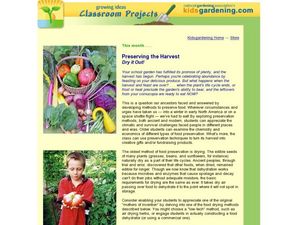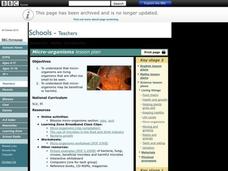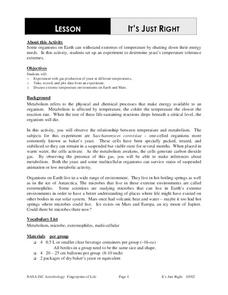Curated OER
Land Quality Issues
For this unit of lessons, students examine land quality issues. They discover food chains and practice reading them. They also examine the erosion of soil and how it affects the environment.
Curated OER
"Investigating Soil Color and Texture"
Ninth graders will identify/understand the differences between soil and dirt. They will classify soil color accurately and use Munsell notation to describe it (Munsell books provided).Students will classify soil texture using the feel...
Curated OER
Smears
In this biology worksheet, students are shown how to prepare a smear and then answer some review questions that address the proper preparation of a sample.
Curated OER
Preserving the Harvest: Dry it Out!
Students explore how people preserved their food in the past. In food preservation lesson, students create different models that enable someone to dry out food, such as a food dehydrator. Students also learn how to...
Curated OER
The Biogeochemical Cycles
The majority of this presentation is a collection of diagrams and graphs that back your lecture on biogeochemical cycles. The last few slides define ecosystems and the Gaia hypothesis. You may find these slides valuable, but will...
Curated OER
Integumentary System: A System, An Organ, the Biggest!
It is only six short slides, but an acceptable outline of the integumentary system. General facts about the system, layers, sublayers, and functions are listed as bullet-points. What would make this presentation more engaging for your...
Curated OER
A Safe Food Supply? Is Your Food Safe to Eat?
Viewers of this slide show learn that pesticides used on food crops can be harmful, but that there are certain allowable levels that should not be hazardous. They find out the rigorous process of inspection that meat must go through...
Kenan Fellows
Designing a Water Treatment Plant
How does dirty water get clean enough to drink? After viewing a PowerPoint that outlines the process water goes through at a water treatment plant, groups work together to design a chlorination chamber for a treatment plant.
Institute for Systems Biology
Introduction to Saline Environments & Microbial Halophiles
If you do not mind wading through unrelated headings (This is not for a physics or STEM course, as it states.) and content (The lesson opens with an article about neurology, not halophiles.), then you will find a valuable resource on...
Curated OER
Micro-Organisms
Students investigate microscopic life by viewing video clips. In this organisms lesson, students view photographs and video clips on the internet of micro-organisms and discuss the harms and benefits of the creatures. ...
Curated OER
Inquiry into Infectious Disease: It's a Germy World After All
Students choose a question from a given list and develop an investigation about it. In this biology instructional activity, students analyze bacterial growth by carrying out a guided experiment. They present their findings in class.
Curated OER
The Nature of Disease
In this disease worksheet, students read information about infectious diseases, how they are transmitted, and how they are treated. Students then complete 6 fill in the blank questions.
Curated OER
Food Safety
In this science worksheet, students read the brochure that is concerned with the concept of food safety. The dangers and advantages are discussed.
Curated OER
Understanding Germs
Students investigate germs. In this health lesson, students use "glow lotion" on their hands and look at them under a black light. Students observe the cleanliness of their hands under the black light.
Curated OER
It's Just Right
Students conduct an experiment to determine the temperature tolerance of yeasts. In this biology lesson, students collect data and compare them by plotting graphs. They explain how extreme temperatures affect organisms.
Curated OER
THE LAUGHING BRAIN 2: A GOOD LAUGH
High schoolers explore various theories about laughter, laughter's effects on our mental health, and the benefits of laughter to our immune system.
Curated OER
Immune System: The Master of Self-Defense
Students examine the role of the immune system in the human body. They conduct a hand-washing experiment, answer questions while viewing videos, discuss key vocabulary, draw and label illustrations, and observe demonstrations and record...
Curated OER
Who's in my soil!?!...and just what do they think they're doing there?
Students discover organisms that inhabit the soil, the beneficial an detrimental roles these organisms play, and the interactions between the organisms and their environment and other organisms. Students participate in four hands-on ...
Curated OER
Sewage Matrix and Field Experience
Students visit a sewage treatment plant and use an exercise to identify the effects of given sewage components on humans and the environment when sewage treatment is bypassed or fails. They read the provided "sewage matrix" worksheet and...
Curated OER
DEMONSTRATING AN EPIDEMIC
Students experience a small scale "epidemic," demonstrating the ease with which disease organisms are spread, and enables the student to determine the originator of the "epidemic." They transfer live bacteria by hand contact, then...
Curated OER
What is all the Fuss about?
Students brainstorm a list of science discoveries and inventions that they think are important. They work in small groups, students examine 1-3 science discoeries more closely. Each group needs a recorder, and they answer three...
Curated OER
Eutrophication Experiments
Observe two different water samples and write down observations. Write a paragraph which predicts the relative amounts of nutrients, nitrates, and phosphates in the water samples. Compare water samples under a microscope.
Curated OER
Operation Anitbody
Students identify the types of cells that are important in the immune system. They investigate the different mechanisms used by white blood cells as they protect the body from foreign invaders. Students are given five case studies,...
Curated OER
Now You See It, Now You Don't
Students explore organic and inorganic objects. In this environmental lesson students perform a composting experiment using flowers in different soils. Students record their observations.
Other popular searches
- Microbes and Public Health
- Microbes and Disease
- Agar Plates Microbes
- Beneficial Microbes
- Growing Microbes
- Identifying Microbes
- Science Microbes
- Microscopic Microbes
- Microbes Disease
- Microbes in Food
- Germs and Microbes
- Microbes in Food Processing























